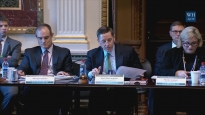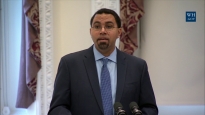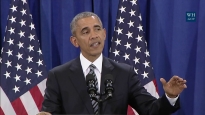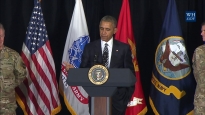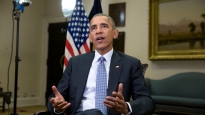Funeral Service for Senator Daniel Inouye
December 21, 2012 | Public Domain
President Obama and Vice President Biden speak at the funeral service for Senator Daniel Inouye.
Remarks by the President at the Funeral Service for Senator Daniel Ken Inouye
National Cathedral
Washington, D.C.
11:50 A.M. EST
THE PRESIDENT: To Irene, Ken, Jennifer, Danny's friends and former colleagues, it is an extraordinary honor to be here with you in this magnificent place to pay tribute to a man who would probably we wondering what all the fuss is about.
This Tuesday was in many ways a day like any other. The sun rose; the sun set; the great work of our democracy carried on. But in a fundamental sense it was different. It was the first day in many of our lives -- certainly my own -- that the halls of the United States Congress were not graced by the presence of Daniel Ken Inouye.
Danny was elected to the U.S. Senate when I was two years old. He had been elected to Congress a couple of years before I was born. He would remain my senator until I left Hawaii for college.
Now, even though my mother and grandparents took great pride that they had voted for him, I confess that I wasn't paying much attention to the United States Senate at the age of four or five or six. It wasn't until I was 11 years old that I recall even learning what a U.S. senator was, or it registering, at least. It was during my summer vacation with my family -- my first trip to what those of us in Hawaii call the Mainland.
So we flew over the ocean, and with my mother and my grandmother and my sister, who at the time was two, we traveled around the country. It was a big trip. We went to Seattle, and we went to Disneyland -- which was most important. We traveled to Kansas where my grandmother's family was from, and went to Chicago, and went to Yellowstone. And we took Greyhound buses most of the time, and we rented cars, and we would stay at local motels or Howard Johnson's. And if there was a pool at one of these motels, even if it was just tiny, I would be very excited. And the ice machine was exciting -- and the vending machine, I was really excited about that.
But this is at a time when you didn’t have 600 stations and 24 hours' worth of cartoons. And so at night, if the TV was on, it was what your parents decided to watch. And my mother that summer would turn on the TV every night during this vacation and watch the Watergate hearings. And I can't say that I understood everything that was being discussed, but I knew the issues were important. I knew they spoke to some basic way about who we were and who we might be as Americans.
And so, slowly, during the course of this trip, which lasted about a month, some of this seeped into my head. And the person who fascinated me most was this man of Japanese descent with one arm, speaking in this courtly baritone, full of dignity and grace. And maybe he captivated my attention because my mom explained that this was our senator and that he was upholding what our government was all about. Maybe it was a boyhood fascination with the story of how he had lost his arm in a war. But I think it was more than that.
Now, here I was, a young boy with a white mom, a black father, raised in Indonesia and Hawaii. And I was beginning to sense how fitting into the world might not be as simple as it might seem. And so to see this man, this senator, this powerful, accomplished person who wasn't out of central casting when it came to what you'd think a senator might look like at the time, and the way he commanded the respect of an entire nation I think it hinted to me what might be possible in my own life.
This was a man who as a teenager stepped up to serve his country even after his fellow Japanese Americans were declared enemy aliens; a man who believed in America even when its government didn't necessarily believe in him. That meant something to me. It gave me a powerful sense -- one that I couldn’t put into words -- a powerful sense of hope.
And as I watched those hearings, listening to Danny ask all those piercing questions night after night, I learned something else. I learned how our democracy was supposed to work, our government of and by and for the people; that we had a system of government where nobody is above the law, where we have an obligation to hold each other accountable, from the average citizen to the most powerful of leaders, because these things that we stand for, these ideals that we hold dear are bigger than any one person or party or politician.
And, somehow, nobody communicated that more effectively than Danny Inouye. You got a sense, as Joe mentioned, of just a fundamental integrity; that he was a proud Democrat, but most importantly, he was a proud American. And were it not for those two insights planted in my head at the age of 11, in between Disneyland and a trip to Yellowstone, I might never have considered a career in public service. I might not be standing here today.
I think it's fair to say that Danny Inouye was perhaps my earliest political inspiration. And then, for me to have the privilege of serving with him, to be elected to the United States Senate and arrive, and one of my first visits is to go to his office, and for him to greet me as a colleague, and treat me with the same respect that he treated everybody he met, and to sit me down and give me advice about how the Senate worked and then regale me with some stories about wartime and his recovery -- stories full of humor, never bitterness, never boastfulness, just matter-of-fact -- some of them I must admit a little off-color. I couldn’t probably repeat them in the cathedral. (Laughter.) There’s a side of Danny that -- well.
Danny once told his son his service to this country had been for the children, or all the sons and daughters who deserved to grow up in a nation that never questioned their patriotism. This is my country, he said. Many of us have fought hard for the right to say that. And, obviously, Rick Shinseki described what it meant for Japanese Americans, but my point is, is that when he referred to our sons and daughters he wasn’t just talking about Japanese Americans. He was talking about all of us. He was talking about those who serve today who might have been excluded in the past. He’s talking about me.
And that’s who Danny was. For him, freedom and dignity were not abstractions. They were values that he had bled for, ideas he had sacrificed for, rights he understood as only someone can who has had them threatened, had them taken away.
The valor that earned him our nation’s highest military decoration -- a story so incredible that when you actually read the accounts, you think this -- you couldn’t make this up. It’s like out of an action movie. That valor was so rooted in a deep and abiding love of this country. And he believed, as we say in Hawaii that we’re a single ‘ohana -- that we're one family. And he devoted his life to making that family strong.
After experiencing the horror of war himself, Danny also felt a profound connection to those who followed. It wasn’t unusual for him to take time out of his busy schedule to sit down with a veteran or a fellow amputee, trading stories, telling jokes -- two heroes, generations apart, sharing an unspoken bond that was forged in battle and tempered in peace. In no small measure because of Danny’s service, our military is, and will always remain, the best in the world, and we recognize our sacred obligation to give our veterans the care they deserve.
Of course, Danny didn’t always take credit for the difference he made. Ever humble, one of the only landmarks that bear his name is a Marine Corps mess hall in Hawaii. And when someone asked him how he wanted to be remembered, Danny said, “I represented the people of Hawaii and this nation honestly and to the best of my ability. I think I did okay.”
Danny, you were more than okay. You were extraordinary.
It’s been mentioned that Danny ended his convention speech in Chicago in 1968 with the word, “aloha.” “To some of you who visited us, it may have meant hello,” he said, but “To others, it may have meant goodbye. Those of us who’ve been privileged to live in Hawaii understand aloha means I love you.”
And as someone who has been privileged to live in Hawaii, I know that he embodied the very best of that spirit, the very best of “aloha.” It’s fitting it was the last word that Danny spoke on this Earth. He may have been saying goodbye to us. Maybe he was saying hello to someone waiting on the other side. But it was a final expression most of all of his love for the family and friends that he cared so much about, for the men and women he was honored to serve with, for the country that held such a special place in his heart.
And so we remember a man who inspired all of us with his courage, and moved us with his compassion, that inspired us with his integrity, and who taught so many of us -- including a young kid growing up in Hawaii –-- that America has a place for everyone.
May God bless Daniel Inouye. And may God grant us more souls like his.
END
11:58 A.M. EST
|
December 7, 2016
|
December 7, 2016
|
December 7, 2016
|
December 6, 2016
|
|
December 6, 2016
|
December 5, 2016
|
December 4, 2016
|
December 3, 2016
|
- &lsaquo previous
- …
- 3
- 4
- 5
- 6
- 7
- 8
- 9
- 10
- 11
- …
- next &rsaquo

